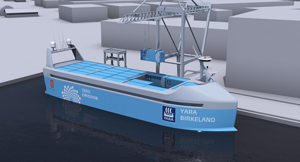According to the Wall Street Journal, the world’s first crewless, autonomously operated ship is scheduled to launch in late 2018.
Known as the Yara Birkeland, the 100-container, electric ship is designed to “navigate itself around other boat traffic and to dock on its own,” using the Global Positioning System, radar, cameras and sensors.
The ship is being jointly developed by two Norwegian companies, Yara International ASA and Kongsberg Gruppen ASA. Yara International ASA is an agriculture firm, while Kongsberg Gruppen ASA builds guidance systems for civilian and military uses.
The Yara Birkeland is currently in development, and is scheduled to “start sailing fertilizer 37 miles down a fiord from a production facility to the port of Larvik” in late 2018. Initially, the ship will be tested with a human at the controls.
The ship will become autonomous in stages, with plans of it operating with fully autonomy, under supervision from shore, in 2020. Before that though, “a single container will be used as a manned bridge on board.” Following that, the bridge will be “moved to shore and become a remote-operation center.”
The cargo ship will cost $25 million, which is almost 3x as much as a conventional container ship of its size, but the backers of the vessel say that annual operating costs will be cut by up to 90 percent because the ship will not need fuel or a crew.
Besides reducing fuel and labor costs, the Birkeland project is also being pitched as a way to cut emissions, as the ship is expected to replace 40,000 truck drives a year through urban areas in southern Norway.
In places such as the U.S. and Europe, ship operators are being asked more and more to introduce cleaner fuels when sailing close to populated coastal areas.
“We want to go zero emission,” says Petter Ostbo, Yara’s head of production who leads the project. “Even if some say climate change is not reality, it’s a business reality because clean sources of energy are more affordable than fossil fuels.”
Ostbo adds that once international regulations are in place for crewless vessels, Yara would look to invest in bigger ships, and use them for longer routes.
Legislation governing crewless ships is not expected to be in place before 2020, according to the International Maritime Organization, which regulates maritime travel.
When legislation is in place though, Kongsberg’s chief executive, Geir Haoy, expects vessels like the Yara Birkeland to be the norm.
“Once the regulation is in place, I can see this spreading fast,” Haoy says. “There is a lot of interest from operators of coastal tankers, fish-transport vessels and supply ships that are knocking on our door.”

